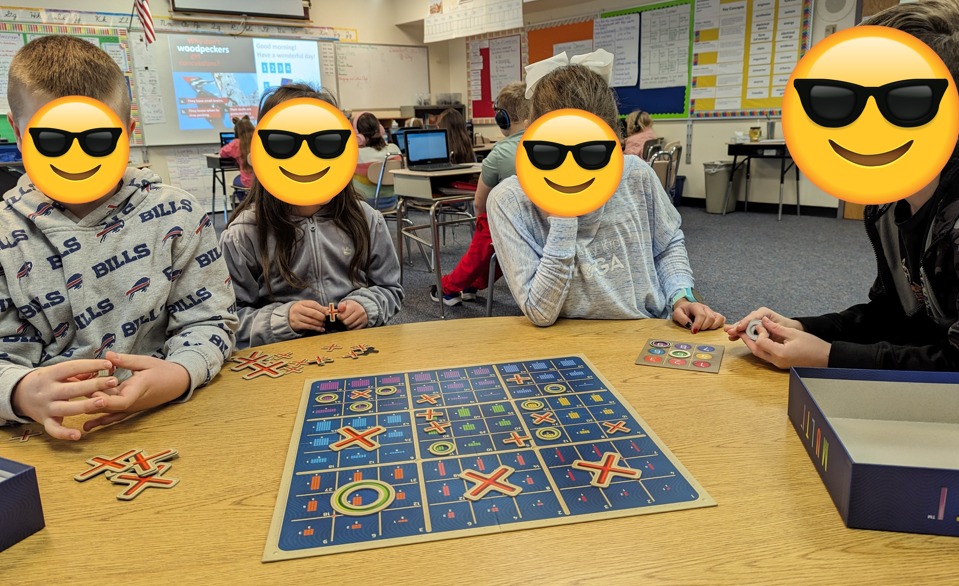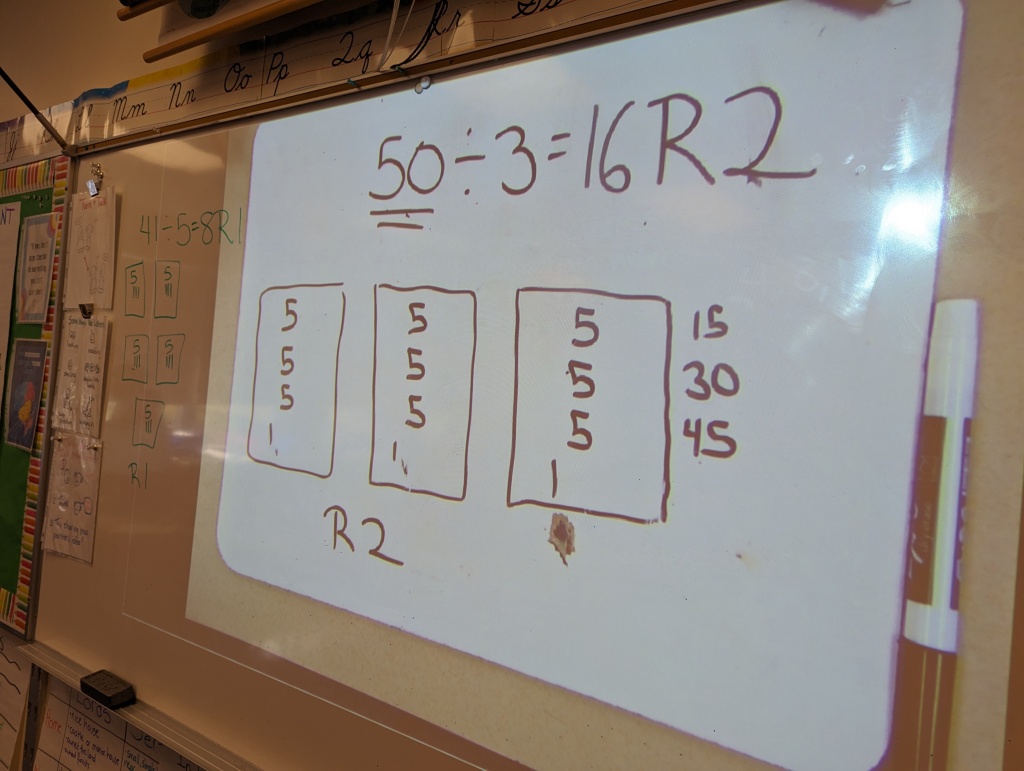This week I’ve got a few teaching wins to share as well as a story of how I had to completely change my math lesson on the spot.
First, the teaching wins:
1) I pulled a small group to play the game Multi. They loved it! Throughout the game they kept remarking, “This is so fun! Where can I get this?”
2) Early in the week we took notes on the lives of serfs during the Middle Ages. Later, students wrote an informative paragraph using their notes. Many of them were amazed they were able to write a full page (or more!). We talked about how good notes support us when we get to writing.
3) We’re working on representing and solving multi-step problems in math. I’ve been mixing numberless word problems, three reads, and worked examples to support their sense making. I’ve been impressed with how many have been able to create accurate models and equations on their own. This doesn’t signal long-term learning, but it’s a good starting point!
4) My principal stopped me in the hall to tell me the school did a survey of parents about communication between home and school. He said several parents made a point of telling him how much they appreciate the emails I send home and the tone of my communications. Yay!
And now for a short story about how I had to completely change my math lesson on the fly with my students:
It all started with this Same and Different warm up. Things were going great. They shared lots of ideas, with me adding in vocabulary as needed, until I asked the students, “What about the quotients? What’s the same or different about those?”
Students chatted in pairs. When I called them back together they said, “A and C are the same because you can do those. B and D are different because you can’t solve those.”
I was a little perplexed. I asked, “Why?”
A student shared, “Because you can’t skip count by 4s to get 15.”
I replied, “15 divided by 4 does have a quotient. Was anyone able to figure it out?”
A student raised her hand. “It’s 3 remainder 3.”
I turned to the room, “Did you hear that word she said, remainder? That’s a word you probably heard in 3rd grade. Talk to your partner and try to remind each other what it means.”
Students chatted in partners, and it was immediately obvious they had no memories to remind each other of. The one student who had shared “3 remainder 3” said she just learned about remainders in an iReady lesson this week. No one else in my class had ever heard of them before!
I was floored! While students learn to interpret remainders in 4th grade, they should at least encounter division with remainders as they’re developing their understanding of the operation in 3rd grade. Division so often results in a remainder, students should be encountering it early on in their learning.
I suddenly realized I could not, in good conscience, continue with my iReady Mathematics Lesson that was all about solving multi-step problems where students would have to divide and interpret the remainder.
Mentally I said, “Shit!”
Out loud I said, “Okay, let’s talk about division with remainders.”
Since the only strategy my students seem to associate with division is skip counting, I went ahead and modeled dealing out cubes under the document camera.
“I’ve got 15 cubes. It says divide by 4. What action am I doing when I divide?”
Silence. Finally, a student shared, “Making groups?”
“Ok, so a group of 3, a group of 2, a group of 3…”
Something finally clicked. “No, they have to be equal.”
For the rest of the lesson, we got out color tiles and students solved division problems on their mini white boards. I walked around and monitored students. If a student had a correct answer, I would pose a new problem for them to solve. If they were having trouble, I offered suggestions.
The interesting thing to me was the sheer amount of direct modeling going on. I don’t think any one of my students used any relationships or anything to divide more efficiently. I was throwing out 50 divided by 3, and they were dutifully dealing out 50 tally marks. Wild!
I tried sharing how you can use larger numbers like 5 and 10 so you don’t have to count by ones all the time, but they were already so overwhelmed with the idea of division have remainders that I didn’t push it.
When we came back together at the end, we did touch on the idea of interpreting remainders.

They recognized that you could cut the remainder in half if it’s candy or money, but not if the remainder is a person.
I’ve decided that when we go back to solving multi-step word problems, I’m going to skip the interpreting remainder problems for now. Honestly, I would have introduced that idea with single-step problems to begin with. This lesson was biting off waaaaay more than my students could chew.





Thanks again for this inside look at math education. Re: divison with remainder, I’m wondering if students at this age have already memorized their multiplication facts, or does that come later?
“I pulled a small group to play the game Multi.” When you do this, what is the rest of the class doing? Which students are selected to play the game, and why not anyone else?
I’d say 4th graders are in the process of learning their multiplication and division facts. It’s usually a multi-year process for most students. Some can recall more facts than others at this point.
To answer your second question, my students work independently on a math or reading program for the first 30 minutes each day. I use this time to pull small groups of students. Normally I’m pulling students to work on a skill that my assessing shows they need additional support in. Other times, I pull students to do something like a math game. The only reason it was just these four students is because I only have one copy of the game. My goal is to cycle through all of the students so everyone has a chance to learn how to play.
Hello!
I’ve been following you for perhaps a year or so and I read every word. I get many ideas for you but “math” is where I pay most attention as we, too, use Ready Math. You’ve given me some great ideas! But Oh. My. Gosh., so your comments today and division with remainders. We’re on the same chapter. It’s the same disaster for the same reasons; heaven have mercy! 🙂
This year admin is pushing us along to do a math chapter a week, “no matter what”. I confess I’d still be on chapter 3 if I didn’t have the master schedule pushing me along, but holy cow, the idea that they’re getting one week of exposure to this (at the same level your students find themselves, too) and then we’re on to fractions!
If nothing else, I get such a sense of validation from your posts about these things. Thank you for chronicling it all!
~Amber
Amber Reed / grade 4 / Castle Rock, CO, USA
On Sun, Dec 17, 2023 at 10:10 AM Teaching to the Beat of a Different
Hi! Thanks for reading and for taking the time to respond. As much as I wish we were both having much better experiences with this program, it does feel good to know I’m not alone! Is this your first year with the curriculum? It’s definitely a learning year for me. I hope with what I’m learning I’ll be able to avoid some of this year’s pitfalls with next year’s students. Fingers crossed! If you ever read a post and have a suggestion about something that’s worked for your class, I’m all ears!
I am SO GLAD you are fighting and inspiring others to fight the “expose them to the chapters and get through them b/c admins said to!” (When I was told to do “catch up” with our spelling book and do 2 chaps/wk instead of 2wks/ chapter, for the first time in my life I said “Yes” with absolutely no intention of doing that…)
Hmmm. The same way the admins can check things off their little lists that are only done by appearance — I’d be tryin’ to figure out a way to have students Do One Thing from that chapter for oh, X minutes so They’ve Been Exposed… and then keep teaching them actual math and what division is.
Wait! Where is the rest of the year? I’m sucked in and I need to know what happens next! Did you stop writing? Or, it could admittedly be operator error. I teach 4th grade and my school is about to adopt Amplify CKLA and i-ready and I’m previewing my future. It’s like time travel and I’m thoroughly enjoying it. Thank you for your calm, detailed expose on the parallel life and times of a 4th grade classroom. Also, Love That Dog is one of my favorite books to read with kids. Good choice. Wishing you a peaceful rest of the year.
Me, too! I’ve never seen such a detailed presentation of what occurs inside a school classroom. Your descriptions and photos make me feel like I was there.
There are still many who don’t know that WhatsApp ringtones can be changed to the song we want, and there is an easy way to restore deleted photos on WhatsApp, don’t miss out. For more information, visit the website. https://waktogel303.blogspot.com/